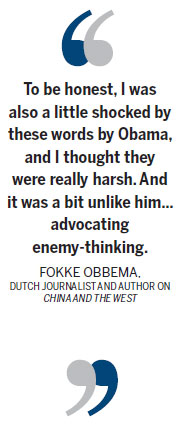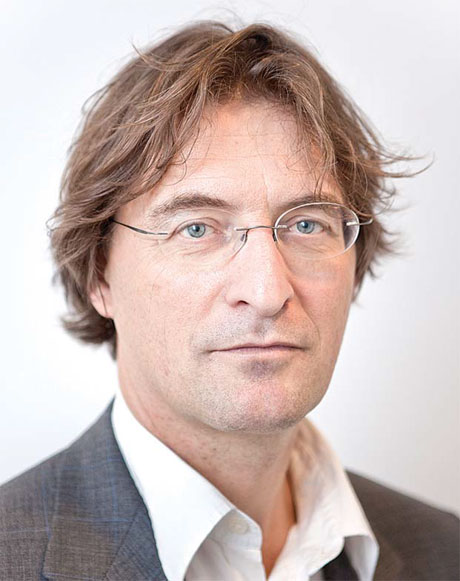US 'erred in leaving China on sidelines'
Updated: 2015-10-23 08:10
By Fu Jing(China Daily Europe)
|
|||||||||||
Dutch writer faults Obama's decision-making over new bank and new trade agreement
Fokke Obbema, a Dutch journalist and author of China and the West, has criticized United States President Barack Obama for trying to contain China, which he believes has been fulfilling its global responsibilities appropriately.
The first mistake, says Obbema, was that the US tried and failed to discourage some countries from supporting the China-led Asian Infrastructure Investment Bank, an institution intended to boost connectivity in Eurasia.
|
Fokke Obbema says China needs to make the transition to a consumption-led economy. Provided to China Daily |
A second error came early this month, when Obama said that "countries like China" should not be allowed to write the rules of the global economy. "We should write those rules," the president said in a statement, "opening new markets to American products while setting high standards for protecting workers and preserving our environment." He made the remarks after the US, Japan and 10 other countries had concluded an historic trade deal, the Trans-Pacific Partnership.
"To be honest, I was also a little shocked by these words, and I thought they were really harsh," says Obbema, speaking to China Daily from South Korea. "And it was a bit unlike him... advocating enemy-thinking."
Obbema visited China in 2008, the year the Olympics was held in Beijing. The dynamism, energy and rapid changes in Beijing and Shanghai fascinated him. It was a shock to the system and a contrast from the cliches and reports about the fast-developing country. The experience inspired him to write a book about China.
In 2009, when the world was in the grip of a financial crisis and recession, China came under fire following the United Nations climate summit in Copenhagen. Such intense events drove Obbema, a senior journalist at the Dutch daily newspaper de Volkskrant, to find out more about China's transformation.
After extensive interviews, with hundreds of people from all walks of life, Obbema published the Dutch version of China and the West: Hope and Fear in the Age of Asia. The English language version, which is also available, has a special chapter dedicated to President Xi Jinping, who visited the Netherlands last year. Obbema attended the banquet, giving him the opportunity to make first-hand observations on the Chinese leader.
"On his personality, I think you can say that he surprised all the China-watchers in the Western world by being a very confident and not a risk-averse type of leader," says Obbema.
Obbema says Xi has demonstrated admirable qualities in the ongoing anti-corruption campaign. "And we have also seen this on the global stage," he adds. "We have seen that in the AIIB, of course."
He says Brussels and Washington have asked Beijing to be a responsible stakeholder and that Beijing has responded positively, especially by offering to set up and lead on the AIIB. "Many European countries have welcomed it, but the US has failed to understand the importance of the AIIB."
Obbema, referring to Washington's decision to exclude China from the TPP, says: "To be honest I think that it's the same case as with the AIIB. The US made a mistake in not including China, because it can easily be seen as a move to contain China."
He presents two models of the China-US relationship: the G2 or the Cold War 2.0. "And I'm afraid that this move, by putting China aside, is more moving toward what I call Cold War 2.0 than I would have liked," he says.

It is a bad strategy by Washington, which should give leeway to the Chinese because they have legitimate cause for wanting to have a greater say in their backyard. The Dutch journalist also says Obama's words after the TPP announcement show a certain level of frustration from Washington toward the balance of power in Asia-Pacific.
He says that if China's policy makers view the US as an opponent then they, too, could fall into the trap of enemy-thinking logic. "I think that should be avoided at all costs. It is very unhealthy if the most important relationship in the world is not going in the right direction."
There are other ties that need nurturing, though. The European Union is China's biggest trading partner, with more than $1.3 billion of goods trading between the two on a daily basis. Obemma suggests that China avoid solely focusing on the UK when it comes to European trade and investment because a strong Europe is in China's interests.
"I think China could help us a little by taking Brussels more seriously and that would be my wish for Chinese strategy."
Xi is the first Chinese president to have visited Brussels, with a key function of the March 2014 trip being to improve business relations. His three-day schedule included a meeting with Belgian royalty, and meetings with European Council President Herman Van Rompuy, European Commission President Jose Manuel Barroso, and European Parliament President Martin Schulz.
Obemma sees the trip as just the beginning. "Leaving politics aside and just focusing on economic cooperation, I think a lot could happen between China and Europe," he says.
There is a crucial opportunities for progress in November, says Obemma, when the EU and China meet for the eighth round of bilateral investment treaty talks. China accounts for less than 5 percent of European investments abroad and foreign direct investment from China is less than 3 percent of the total FDI inflow to the EU, according to a report from the Beijing-based law firm King & Wood Mallesons. Both the EU and China hope a comprehensive bilateral investment treaty will narrow the gap between trade and investment levels.
Obemma says Europe is in a very difficult position because of the refugee and euro crises and that the only solution to both problems is to strengthen Europe on an institutional level in Brussels. "And if China takes Brussels more seriously then at least that is some kind of help; I don't expect China to solve our euro crisis - we have to do it ourselves."
He says there are other ways that China can expand its presence on the world stage, especially when it comes to global security and the fight against Islamic State terrorists. "These are barbarians that the international community has to fight, and I think, when we're talking about behaving responsibly on an international level, everybody should join this fight. As a superpower, China should do it as well."
It does not mean China should neglect its domestic challenges. Obemma has become well versed in the country's priorities, namely fighting corruption, income inequality and dealing with pollution, after meeting and talking to hundreds of Chinese.
He says that China has faced these three challenges for years and that there is a clear need to overcome them. "In my view, when it comes to China on a domestic front, I think the biggest problem is the environment," he says.
The second priority is the anti-corruption campaign. "The third one for me would be for me the gap between the rich and poor," says Obbema, adding that his big wish for China is that the leadership takes the opportunity in the coming five years to build a social safety net.
In an opinion piece for The Independent in London, published in August, he wrote: "It is important to note that China still has the largest number of poor people in the world, after India, despite decades of growth." Economic woes, such as slower growth and turbulent markets, will have an impact on income inequality. Improved welfare measures will benefit the country.
"It is really necessary for China to make the transition to a consumption-led economy," Obbema says.
Bio
Fokke Obbema
staff writer foreign desk, specializing in China and Europe, de Volkskrant
Author of the book 'China and the West, Hope and Fear in the Age of Asia' - nominated for the J.M. Brusseprijs (an award for the best non-fiction books)
Age: 53
Born: Amsterdam
Education:
University of Amsterdam, Universite de Paris I in Paris, Dutch law, 1981-1987
City University, London, international journalism, 1987-1988
Career:
Press officer and staff writer at Amnesty International, 1981-1985
Staff writer, Quote, 1989-1991
Chief editor of the media section, De Volkskrant, 1996-1999
Chief editor of the Editorial pages De Volks-krant,1999-2002
Correspondent in Paris, de Volks-krant,2002-2007
Chief editor Economic Section, de Volks-krant,2007-2011
Book: The Circle by Dave Eggers
Film: Manhattan (1979, dir. by Woody Allen)
Music: Formidable by Stromae
Hobbies: Tennis, cycling and reading
fujing@chinadaily.com.cn
( China Daily European Weekly 10/23/2015 page28)
Today's Top News
Global Xpress mobile satellite broadband service will be rolled out throughout China
China, UK sign landmark deals
Chinese set to invest $13b in UK property
Xi says China will not experience a 'hard landing'
UK pledges to back China to talk FTA with EU
Britain eases visa regime for Chinese tourists
Xi tells UK parliament of 'first achievements'
Chinese president holds talks with British PM
Hot Topics
Lunar probe , China growth forecasts, Emission rules get tougher, China seen through 'colored lens', International board,
Editor's Picks

|

|

|

|

|

|







